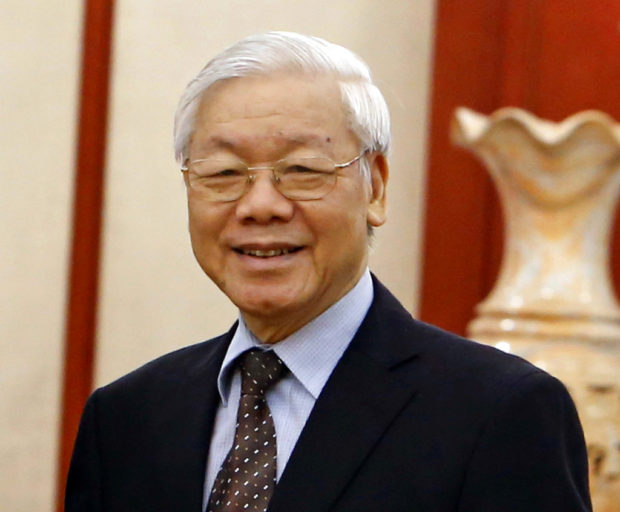Vietnam nominates Communist Party chief to become president

In this Jan. 25, 2018 file photo, Vietnam’s Communist Party General Secretary Nguyen Phu Trong poses as he meets with US Secretary of Defense Jim Mattis before their talks in Hanoi, Vietnam. AP
HANOI, Vietnam — Vietnam’s ruling Communist Party has nominated its general secretary for the additional post of president, succeeding President Tran Dai Quang, who died last month, and ending a decades-long policy of separating top leadership positions.
The government said in a statement that members of the Party Central Committee unanimously agreed to nominate “comrade Nguyen Phu Trong” for the position.
If confirmed by the rubber-stamp National Assembly which convenes later this month, the 74-year-old Trong will be the first Vietnamese leader to hold the two positions since founding President Ho Chi Minh in the 1960s. Quang died last month after battling a viral illness for more than a year.
Economist Le Dang Doanh, a former government economic adviser, said it makes sense to merge the powerful position of party general secretary with the largely ceremonial presidency, but cautioned that there should be a mechanism to control power.
“The question here is there needs to be a mechanism to supervise power to avoid the abuse of power if the power is concentrated too much in an individual,” he said Thursday.
Article continues after this advertisementDoanh said it’s unclear whether the country’s next leader will also hold both positions, and the party would decide based on the particular candidate.
Article continues after this advertisementSpeaking at a regular briefing, Foreign Ministry spokeswoman Le Thi Thu Hang said the move was made “in accordance with the constitution and meets the aspirations of voters and people.”
The move is unlikely to change the country’s course, according to Le Hong Hiep, a fellow at the ISEAS-Yusof Ishak Institute in Singapore.
“The merger is unlikely to generate any economic implications for Vietnam and its business environment as the country’s economic policies will remain unchanged,” he wrote in an institute publication on Thursday. “In political terms, however, the concentrated power structure will make the Vietnamese political system more unitary and less pluralistic. While such a power structure may be more efficient under certain circumstances, it will also generate certain risks as the whole political system will now depend on its ability to choose the right leader as well as to check his power.”
Trong, the party’s former chief ideologue, was elected to the all-powerful Politburo in 1997, serving as the Communist Party chief of Hanoi and chairman of the National Assembly before being promoted to general secretary in 2011. He was re-elected to another five-year term in January 2016.
The country has seen an increased crackdown on dissidents and on corruption, with scores of high-ranking officials and executives jailed since 2016 under Trong’s watch.
“Fighting corruption is a difficult, complicated and long-term job,” Trong told a recent anti-corruption conference. “Corruption will surely be prevented and pushed back step by step, contributing to making our party and state increasingly strong and transparent, and meeting the requirements of the revolutionary cause and the people’s aspirations.” /ee